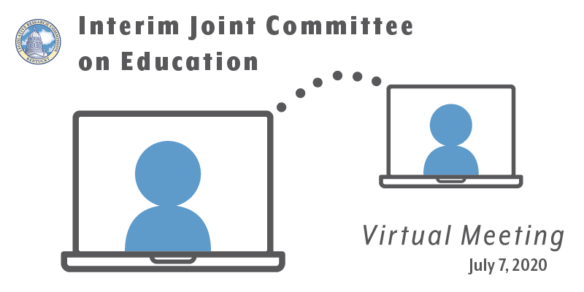
By Sky Carroll
sky.carroll@education.ky.gov
At its July 7 meeting, the Kentucky General Assembly’s Interim Joint Committee on Education heard updates regarding reopening schools amid the COVID-19 pandemic from the Kentucky Department of Education (KDE), along with other Kentucky education leaders and the commissioner of the Kentucky High School Athletic Association (KHSAA).
On June 24, KDE Interim Commissioner Kevin C. Brown issued a memorandum – signed by Lt. Gov. and Education and Workforce Development Cabinet Secretary Jacqueline Coleman – in which KDE temporarily extended flexibility for how districts report their attendance rates to be used for funding purposes.
KDE Associate Commissioner Robin Kinney explained to the committee the Support Education Excellence in Kentucky (SEEK) funding formula for the 2020-2021 school year. Under normal circumstances, SEEK funding is awarded based on in-person attendance data. Because of the pandemic and the switch to non-traditional instruction (NTI), Senate Bill 177 (2020) allowed districts to choose whether they wanted to use attendance data from the 2018-2019 or the 2019-2020 school year for 2019-2020, as the 2018-2019 data may be a more accurate reflection of a district’s numbers.
The memorandum allows that option to continue into the 2020-2021 school year, giving districts more predictability in their funding to ensure preparedness and flexibility.
Also in the June 24 memorandum, the state announced it was taking steps to allow schools to use unlimited non-traditional instruction (NTI) days for the 2020-2021 school year. Brown also recommended that the Kentucky Board of Education adopt an emergency administrative regulation that sets guidelines on how to record student participation during traditional instructional days, NTI days, and blended in-person and NTI days.
David Cook, division director of KDE’s Office of Continuous Improvement and Support, said that regardless of the type of learning used during the 2020-2021 school year, all student attendance will be measured using the participation model.
“It’s a way of measuring presence when students aren’t in a seat,” Cook said. “It measures engagement.”
For students who are learning in person, their physical presence will qualify as their participation. For those learning remotely, participation can be recorded several ways, such as phone calls with teachers, group chats with teachers and classes or groups; time on a virtual learning management system, or submitting work through an online platform or through paper assignments.
“I do foresee the hybrid model coming to an end when there’s no pandemic, but right now, it’s the safest option for learning,” Brown said.
Several committee members raised concerns over the return to school in the fall and students wearing masks.
“Wearing masks will be an expectation. It’s in the best judgement from public health officials,” Brown said. “Districts should adhere to the Healthy at School guidance to be as safe as possible, which includes wearing masks and social distancing whenever possible.”
Eric Kennedy, director of advocacy for the Kentucky School Boards Association (KSBA), discussed feedback gathered from surveys of school boards about their most pressing concerns for reopening.
“Our boards are working to discern what kinds of instruction students, families and teachers prefer,” Kennedy said.
Kennedy identified the top six concerns, which are providing multiple modes of instruction; staffing; funding and procurement; support for virus mitigation efforts; district liability; and assessments.
“We want to do all of this safely. KSBA hopes districts can provide in-person instruction as much as possible, as safely as possibly,” Kennedy said.
He also said KSBA would support another waiver for standardized testing for the 2020-2021 school year. The U.S. Department of Education announced March 20 that students impacted by school closures due to the pandemic could bypass standardized testing for the 2019-2020 school year. The waiver allowed for the cancellation of K-PREP testing in Kentucky on March 24.
Eddie Campbell, president of the Kentucky Education Association, said the concerns he has heard from educators revolve around three things: resources, responsibilities, and health and safety. He said all need to be addressed further as soon as possible.
Campbell said educators are concerned about schools having the ability to pay for added materials and supplies needed for this year amid the pandemic. There also are concerns about the many new responsibilities teachers will have along with their usual teaching responsibilities, such as taking temperatures, distance learning, sanitization and the possibility of extended schedules.
“This will not be easy, but our educators always do difficult things when on behalf of students. This pandemic is no exception,” Campbell said.
Jim Flynn, executive director of the Kentucky Association of School Superintendents, agreed that there still are concerns that need to be addressed and discussed the need for continued flexibility, including in the calendar in case of intermittent closures, as well as in instructional minutes. He praised the relief provided through SB 177.
“This pandemic has affirmed the importance of our schools,” Flynn said. “Education really requires an in-person component to have the highest benefit.”
As for athletics, Commissioner Julian Tackett of the Kentucky High School Athletic Association (KHSAA), said fall sports will happen, though out-of-state athletic travel plans will have to be reaffirmed by school boards. However, he said “some states should be off limits.”
Tackett said KHSAA is continuing to work with districts on restarting athletics and said that athletics are the number one tool in preventing dropouts.
MORE INFO …
- Interim Joint Committee on Education
- Kentucky Department for Public Health’s COVID-19 webpage
- KDE’s COVID-19 webpage
- COVID-19 Hotline (800) 722-5725



Leave A Comment